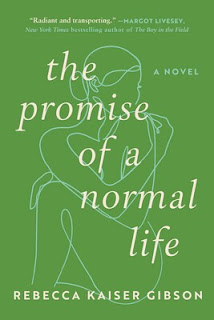Rebecca Kaiser Gibson is the author of the new novel The Promise of a Normal Life. Her other books include the poetry collection Girl as Birch, and her work has appeared in a variety of publications, including Slate and AGNI. She lives in Marlborough, New Hampshire.
Q: What inspired you to write The Promise of a Normal Life, and how did you create your protagonist?
A: Many of the sections of this novel were written separately, quite long ago, as stories, over many years and what inspired me then was just a need to shape what was in my head.
However, I can point to an external event that prodded me to form the pieces into a whole. In the recent flourishing of MeToo confessions, made long after the assault described were to have occurred, and, pointedly, watching the Kavanaugh hearings, I was intrigued by the forces that keep women and girls silent and even in denial, for years.
Through that lens, I saw my character’s upbringing, her relationship to her family, her private conclusions about things, all could be seen to contribute to her acquiescence, her secrecy and her micro rebellions.
Q: Why is the protagonist unnamed?
A: While some speculate that the protagonist “refuses to share her name” in an act of self-negation, my thinking is almost the opposite. I wanted to create a world, her world, in which she is the subjective center. If I’d given her a name, I’d have added an external perspective, made her one of many, and removed an aspect of her experience.
Q: The writer Margot Livesey said of the book, “Rebecca Kaiser Gibson writes with a poet’s precision and a novelist’s sense of character as she deftly evokes her narrator’s family, childhood summers, friendships, travels, and love affairs.” What do you think of that description, particularly as it relates to the idea of being both a poet and a novelist?
A: I admire Margot’s own precision and her varied and fascinating characters. I think I understand what she’s getting at with her observation.
What I associate with writing poetry is a sensation of working in four-dimensional space – creating a being of which the elements of echo and assonance, reach and retreat, pause and plunge etc. interact on both a sensed/felt level and a literal one of the “meaning” of words.
The sensation in writing the novel was more like taking a long walk: the terrain was varied but the steps had to land on the ground, and progress had to be made and even noticed. It was a great pleasure to try to manage both impulses in some sort of harmonic tandem. It was fun.
Q: How was the book’s title chosen, and what does it signify for you?
A: Confession time. I didn’t come up with the title. A friend did – not as a title even, but casually in describing her reading of the book. At first, I resisted. But very quickly I felt the power of it.
Of course, one’s first reaction is What’s Normal? But from the character’s perspective and behavior, there’s a steady, if subtle, attempt to “normalize”, i.e., often justify what she witnesses. And then there’s the issue of The Promise of…. I hope the thread of books, movies and various stars that offer her what she incorporates as “normal” is understood by my readers.
Additionally, I liked the notion that even if much of what’s expected to be normal is artificially manufactured, there is some kind of innate promise that keeps her moving, if haltingly, toward more acknowledgement of herself as a person among and with others.
Q: What are you working on now?
A: I have two new poetry manuscripts underway – I’m sure you’ll see that there are correspondences with the novel. Their titles are “Linked” and “What if My Waking is a Dream.” Also, I’m working on a series of stories that, like the novel, have hidden, dormant or dozing in my closet for decades and are ready to get finished.
Q: Anything else we should know?
A: Well, here’s an amusing thing: A designer wanted to surround the book announcement with plants and I was aghast. Where did these fronds come from? I asked, sort of confrontationally. I supported my objection with a quick word search for the word plants – and found very few instances.
I mentioned the conversation to my daughter who said, Mom, they are everywhere. Sure enough, gardens, blossoms, vines–– they are all over the place. I realized then that I am so inclined to find connection in what we call “nature” that I’m unaware that it’s the air I’ve given the character to breathe. Now I’ll need to be aware of that habit I guess…
--Interview with Deborah Kalb


Thanks Deborah. Your questions spurred me to new insights!
ReplyDeleteYou're very welcome, Rebecca, and thanks for your thoughtful answers!
Delete